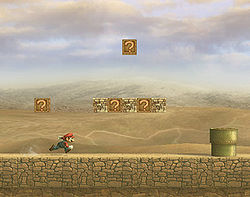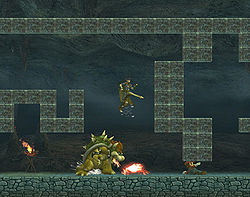Mushroomy Kingdom
| Mushroomy Kingdom | |
|---|---|
  File:MarioSymbol.png The Ground (top) and underground (bottom) stages | |
| Universe | Mario |
| Appears in | Brawl |
| Availability | Starter |
| Crate type | Normal |
| Tracks available | Ground: Ground Theme (Super Mario Bros.) Ground Theme 2 (Super Mario Bros.) Gritzy Desert Underground: Underground Theme (Super Mario Bros.) Underwater Theme (Super Mario Bros.) Underground Theme (Super Mario Land) Bolded tracks must be unlocked |
| Article on Super Mario Wiki | Mushroomy Kingdom |
Mushroomy Kingdom (いにしえっぽい王国 Inishie ppoi ōkoku, Ancient-ish Kingdom) is a stage in Super Smash Bros. Brawl based off levels in Super Mario Bros. This stage is a 2.5D (3D structure in a 2D perspective) replica of the original World 1-1 with enhanced graphics and a deserted look. Ruins can be seen in the background and life is absent apart from the fighters. Game director Masahiro Sakurai stated in the stage's update on the Smash Bros. DOJO!! that he wanted to create the impression that the kingdom had been abandoned since its initial appearance in 1985, 23 years prior to the release of Brawl. The stage returns as a familiar stage in Super Smash Bros. for Nintendo 3DS.
Stage Description
The stage scrolls to the right slowly and one can see familiar Mario landmarks like the flagpole and castle at the end of the level, but it keeps on scrolling. There are both destructible blocks, as well as 'question' blocks, which release an item when struck. '?' blocks that contained coins and power-ups in Super Mario Bros. will release multiple items if attacked more than once.
There is also a chance when Mushroomy Kingdom is selected that the stage will actually load a similar stage based off of World 1-2, an underground stage. This stage has many blocks that need to be destroyed to pass through, and ends at the same pipe that it did in Super Mario Bros, but players must jump over it for the stage to restart. Originally, this is where the first Warp Zone was situated. Its removal makes it one of the only features of the two levels that was not recreated for Brawl.
Mushroomy Kingdom's side scrolling properties make it technically the largest stage. As the layout repeatedly loops, it could be argued that the stage is actually infinite. However, New Pork City is the largest non-scrolling Brawl-original stage.
Tournament Legality
Due to the side-scrolling nature and ledges that can't be grabbed, this stage is banned from official tournaments. The underground level also has an unusually low ceiling, and it is possible to KO with some up throws at 0%. The underground level can additionally create caves of life.
Choosing the level
Mushroomy Kingdom has a randomizer script attached to it. When chosen at the Stage Selection screen, both the Ground and Underground levels have a 50% chance of loading. However, it is possible to guarantee which version of the stage is used by holding down a certain button as it is selected. Following is a guide to doing this with all four controllers using the default control schemes:
Ground
- GameCube Controller: X or Y
- Classic Controller: X or Y
- Wii Remote & Nunchuk: C
- Wii Remote: A
Underground
- GameCube Controller: L or R
- Classic Controller: L or R
- Wii Remote & Nunchuk: Z
- Wii Remote: B
Origin
This stage comes from the game Super Mario Bros. Mushroom Kingdom is where the majority of where the Mario games take place. As stated before, the game director of Brawl, Masahiro Sakurai, said in the stage's update on the Smash Bros. DOJO!! that he wanted to create the impression that the kingdom had been abandoned since its initial appearance in 1985, 23 years prior to the release of Brawl. This explains the '-y' added to the title.
This stage is an accurate replica of the layout of levels 1-1 and 1-2 of Super Mario Bros. Several small changes were made to facilitate gameplay here: the enemies that originally appeared in these levels (such as Goombas) were removed, Warp Pipes were made inaccessible, and there is no Warp Zone from level 1-2 of Super Mario Bros. In Super Mario Bros. players can jump to hit a flashing question mark block to get an item. These blocks release items in Brawl as well, if they are jumped into from below or attacked. Ordinarily, Mario couldn't break brick blocks in Super Mario Bros., but when he gets a Super Mushroom, he could jump and hit a brick block to break it. In Brawl, however, the player can break brick blocks without the use of a Super Mushroom. At the end of the first three levels of the eight worlds the player would have to jump a flagpole to pull down the flag and then enter a small or large castle. In this stage in Brawl, the flagpole and a small castle can be seen, but characters can't jump on the flag pole or go inside the castle.
Levels 1-1 and 1-2 as they originally appeared in Super Mario Bros.
Trivia
- On the World 1-2 version of this stage, it is possible to dodge Olimar's End of Day in the underground by standing on the very top of the level for the duration of his attack.
- The stage's scrolling speed (for both versions) is such that the stage makes exactly one loop in two minutes, the default time for a timed match.
- Characters with stationary Final Smashes, such as Donkey Kong's Konga Beat and King Dedede's Waddle Dee Army, will slow down the scroll speed for the duration of the Final Smash attack.
- When the black palette of Mr. Game & Watch is used on the underground version, he appears to be dark yellow. Oddly, when in photo mode, the palette switches back to black.
- In Sudden Death, where items normally do not drop, items can still be obtained from the question-mark boxes.
- Instead of Space Jumping when off-screen like he does in the Subspace Emissary, Pokémon Trainer instead appears at the other side of the screen with no transition.
External links

